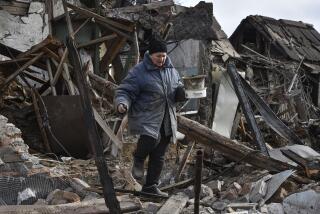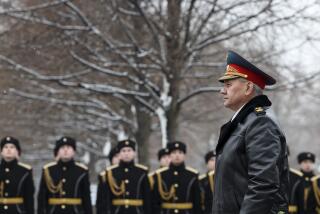Airport Reopens--to Russians and Aid Flights
War-scarred Kosovo passed two milestones Tuesday: the arrival by air of additional Russian troops, marking what officials hope will be the final agreement between Russia and NATO to cooperate in the province, and the reopening of the Pristina airport for humanitarian flights.
Two planeloads of Russian troops and gear landed at the newly repaired airport, along with a U.N. charter flight from Italy carrying satellite telephone equipment and generators for relief organizations.
The Italian flight was the first civilian aircraft to land since peacekeepers entered Kosovo on June 12. U.N. and NATO officials said it will be the first of many to bring in the supplies and personnel needed to rebuild Kosovo.
In addition, commercial flights may resume within two months, said British Brig. Gen. Andrew Bellamy, who has been appointed by NATO to head air operations in Kosovo, a province of Yugoslavia’s dominant republic, Serbia.
The commander of the Russian troops at the airfield, Gen. Anatoly F. Volchkov, told reporters that six Russian military flights carrying equipment and “from 30 to 40 people per aircraft” were expected in Pristina on Tuesday. Later in the day, however, it appeared that only two had made it because of technical difficulties in Russia.
Russian troops, in a blitz that caught the North Atlantic Treaty Organization by surprise, raced into Kosovo from Bosnia-Herzegovina ahead of NATO forces June 12 and took control of the airport in order to augment their claim to a significant role in the peacekeeping operation.
That set in motion a series of delicate political and military negotiations, the last of which took place Sunday and Monday in Moscow, to determine where Russian peacekeepers would be stationed, what their duties would be and how their mission would fit into NATO’s chain of command.
The Russians were blocked by NATO from landing their troops until the recent differences were resolved. After a final agreement was announced Monday, the Western alliance signaled its allies in the region to clear Russian flights through their airspace so that the airlift of troops could begin.
NATO officials said they believe that the way has been paved for the smooth deployment of 3,600 elite Russian troops within the next month, to work alongside about 46,000 NATO and other international peacekeepers in KFOR, the Kosovo Force.
Although the Russian troops will not be permitted, as they had wished, to control any one sector of Kosovo, their dispersal across the province is expected to reassure Kosovo’s minority Serb population. As many as 80,000 of nearly 200,000 Serbs in the province fled last month after NATO peacekeepers replaced Yugoslav troops and security forces.
Many Kosovo Serbs have preferred to relocate to other areas of Serbia and to Montenegro, the other republic in the Yugoslav federation, rather than stay in Kosovo and face the wrath of returning ethnic Albanian refugees driven out during the spring by Yugoslav troops.
The Russian deployment will take place by land, air and sea, KFOR spokesman Lt. Cmdr. Louis Garneau of Canada said Tuesday during a news conference in Pristina, the provincial capital.
One battalion will be stationed in the town of Kosovska Kamenica in southeastern Kosovo; two battalions will be based in Malisevo and Orahovac in southern Kosovo; and a fourth battalion will be deployed in Lausa in the center of the province.
A member of the Russian military will oversee administration, security and maintenance at the Pristina airport. A NATO officer will be in charge of flight operations and air-traffic control.
The overall direction of the airfield and airspace will fall under the command of Bellamy, who reports directly to KFOR’s commander, British Lt. Gen. Mike Jackson.
Bellamy told reporters that radar and navigational aids have been restored at the airport, and bomb craters repaired on the runway, thanks to British and Russian cooperation over the past two weeks.
He called the reopening of the facility a significant moment “that brings together for the first time everything we have been trying to achieve.”
The airport was a frequent target of attacks during NATO’s 11-week bombing campaign against Yugoslavia, and shrapnel still litters its parking area. The terminal was badly damaged but has been partially restored by the Russians.
All KFOR participants will be able to use the airfield, and commanders of the five NATO sectors will be allowed to issue orders to the Russians, Garneau said. A logistics base will be established near Kosovo Polje, a town about five miles north of the airport, to support Russian troops and their KFOR counterparts.
Volchkov, the Russian general, said he believed that “all the problems have been solved” between his forces and NATO and that some Russian troops have already been sent to their assigned areas.
He also had reassuring words for Kosovo’s ethnic Albanians, some of whom are anxious about having even a few Russian troops in their midst.
“The main job of our contingent is the security and safety of everyone,” Volchkov said, “whatever their nationality.”
Because of their shared Orthodox Christian religion and Slavic ethnicity, and because of the strong sympathy for Serbia shown by the Russian public, Serbs in Kosovo see the Russian troops as their special guardians against reprisal attacks by members of the returning ethnic Albanian majority.
This week, a Serbian baker was shot and killed by an unknown assailant or assailants in Priluzje, a village about eight miles northwest of Pristina.
In another incident, three wounded Serbs were found near a U.S. checkpoint outside the village of Budriga in southeastern Kosovo. Two had been shot, and one had suffered an unspecified back wound. One of the victims, a 14-year-old boy, died after being transported by helicopter to a U.S. military camp near the southeastern town of Gnjilane.
And in another development, the International Committee of the Red Cross said Tuesday that it had begun visiting some of the approximately 2,000 Kosovo Albanian prisoners being held in jails elsewhere in Serbia. The prisoners were taken from the province when Yugoslav forces withdrew last month.
More to Read
Start your day right
Sign up for Essential California for news, features and recommendations from the L.A. Times and beyond in your inbox six days a week.
You may occasionally receive promotional content from the Los Angeles Times.






